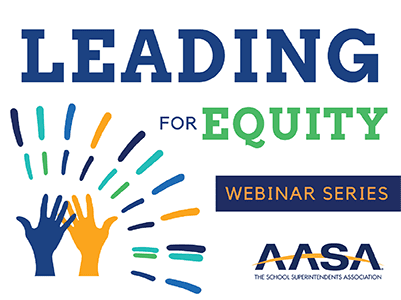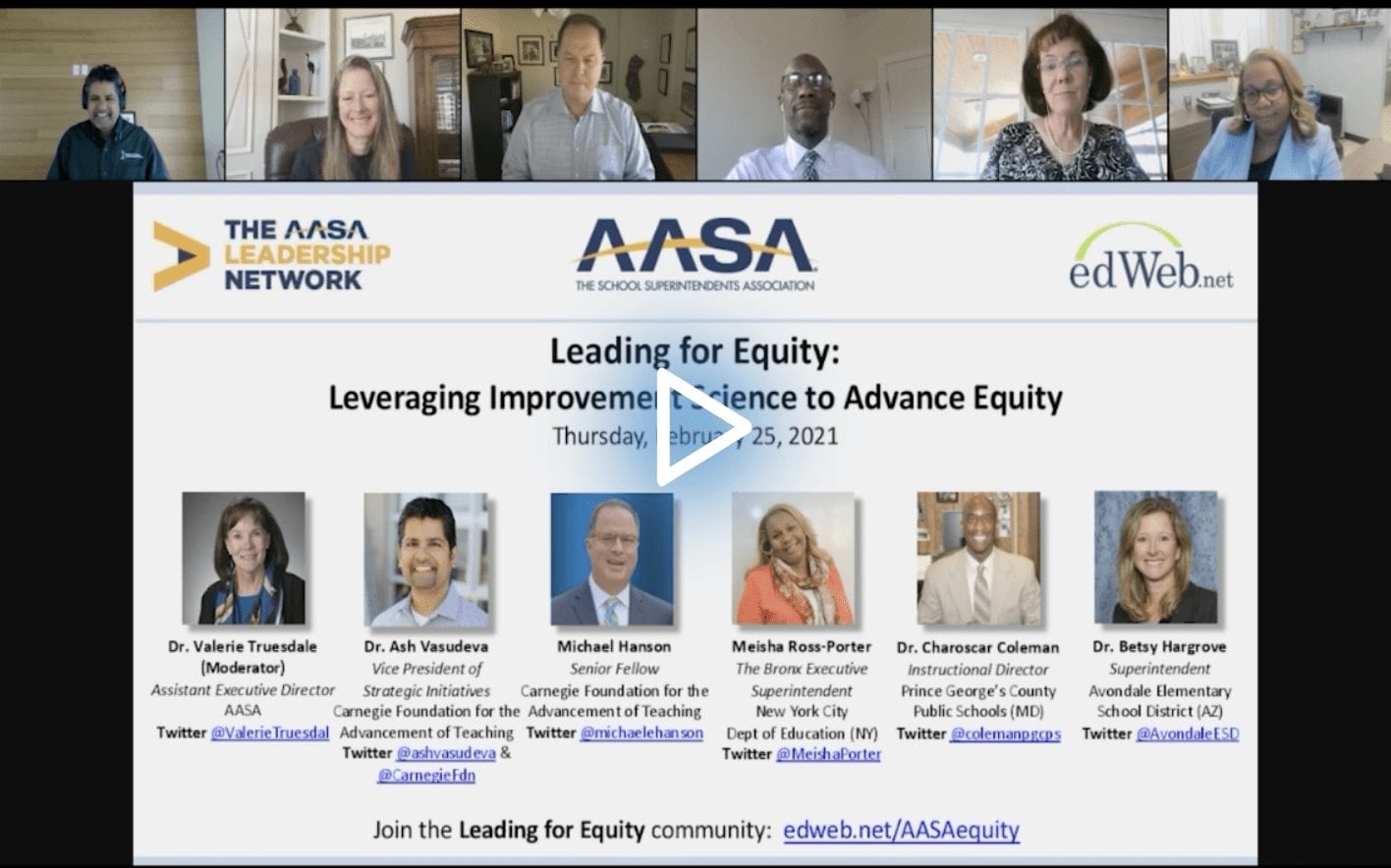Using Learning Science to Create Action on Equity
By Stacey Pusey
When many schools and districts address equity problems, they tend to look at the big picture and overall outcomes. But according to the presenters in an edWebinar, hosted by AASA, The School Superintendents Association and AASA’s Leadership Network, the more effective approach is to identify specific problems for specific groups of students and make key changes that address those individual needs. By combining the small group focus with short cycles of improvement, schools can truly create a system where every child is receiving the best possible education.
Part of the iLEAD program from the Carnegie Foundation for the Advancement of Teaching, the presenters follow the principles of improvement science in their approaches to equity. According to iLEAD, “Improvement science deploys rapid tests of change to guide the development, revision and continued fine-tuning of new tools, processes, work roles and relationships.” In other words, the school leaders are continuously developing new approaches to their equity issues and engaging in cycles of iteration and innovation to meet their goals.
Key Components to Using Improvement Science to Advance Equity
- Identify the root cause. Instead of just looking at test scores and saying there’s an equity issue, leaders need to dig down into each group of students and determine why they’re not meeting their learning goals.
- Invite a diverse group to analyze the problems. While administrators have a high-level view of what’s happening in the school, they need to have the educators closest to the students help them figure out what is happening with the students. Make it a collaborative process and gather data from everyone involved.
- Examine adult practices. Administrators and educators need to look at their own actions and determine what role they play in student outcomes. This includes being honest about biases they’re bringing to the school and their student interactions. Often, a solution will combine changing adult practices with other programs that support student achievement.
- Set measurable goals. Once leaders have identified a problem and a possible solution, they need to determine how they will know if their actions are successful. This focuses staff on taking action, rather than on just developing empty plans with no concrete outcomes.
- Devote time and resources to the problem. It will take time for staff to recognize and change their faulty practices. Staff need to engage in continuous professional development and may need outside training. You may also need to realign school resources for any new programs.
- Make learning collective. In addition to educators meeting and discussing their challenges and successes, it’s important for school leaders to do the same. They may have a problem that another school has had success with or have a solution that could aid a colleague.
- Meet students and staff where they are. Leaders really need to understand the individual needs and develop processes that allow each person to grow, including teachers and staff.
Most important, the presenters emphasized the cycles of iteration and innovation are never done. Instead of best practices, they talk about good practices because there are always changes needed to provide a high-quality education to meet all students’ needs.
This edWeb broadcast was hosted by AASA, The School Superintendents Association and AASA’s Leadership Network, providing premier professional learning for educational leaders.
About the Presenters
Dr. Ash Vasudeva
Dr. Ash Vasudeva is Vice President of Strategic Initiatives, where he oversees the Carnegie Foundation’s policy and communications efforts to build the field’s capacity for improvement research and networked improvement communities. Prior to joining Carnegie, Dr. Vasudeva was a senior program officer at the Bill & Melinda Gates Foundation, where he focused on supporting school systems to implement college- and career-ready standards and strengthen educator effectiveness systems.
Previously, Dr. Vasudeva was Co-executive Director of Stanford University’s School Redesign Network, where he developed the LEADS network (Leadership for Equity and Accountability in Districts and Schools), which enabled superintendents and their cabinets to collaborate on systems reforms with faculty from Stanford’s School of Education, School of Business, and School of Design (d.school). Dr. Vasudeva taught science at Pasadena High School and entered the field through Teach For America. He received his Bachelor of Science degree from Carnegie Mellon University and his doctorate from the University of California, Los Angeles.
Dr. Charoscar Coleman
Dr. Charoscar Coleman earned a dual degree in economics and business from the University of Pittsburgh, a master’s degree in secondary education from The George Washington University, and a doctorate in educational leadership and policy studies from the University of Maryland College Park.
Dr. Coleman has served the students of Prince George’s County Public Schools for the past 25 years. Dr. Coleman currently serves as an instructional director. In this role, he is responsible for supporting schools across the school district by providing direct coaching support to principals and articulating the school system’s mission, goals, accomplishments, needs, and strategies to area schools and communities. He has worked with schools serving students from kindergarten through 12th grade. Over the course of his career, Dr. Coleman has served as a high school teacher, assistant principal, and principal of three different schools: Dwight D. Eisenhower Middle School, Central High School, and Dr. Henry A. Wise High School. During his 14 years as a principal, Dr. Coleman was twice nominated for The Washington Post Principal of the Year Award.
Mike Hanson
Mike Hanson is a senior fellow at the Carnegie Foundation for the Advancement of Teaching. He is the former superintendent of the third-largest urban school district in California, and Co-founder and inaugural President of CORE, a nonprofit organization that seeks to improve student achievement by fostering highly productive, meaningful collaboration and learning between California’s largest school districts. Mike currently serves on the board of Valley Children’s Healthcare System where he chairs the compensation committee.
Prior to his 12-year tenure as Superintendent, Mike served in many roles as a public educator in both New York and California, including deputy superintendent, high school principal, social science teacher, and coach. His work has focused on teacher, school, and district improvement through building capacity in others, systems knowledge, formalized collaborative relationships, and improved governance. His work in continuous improvement focuses on issues of equity and access. Areas of demonstrated expertise are improved student achievement, improved behavior of students, increased diversity of high-quality human capital, and leadership development. His interests include strategic creation and use of data systems as well as supports for public school employees. Mike is a California native who lives in Sacramento with his wife, Julie. They laugh constantly with their three children.
Dr. Betsy Hargrove
Dr. Betsy Hargrove has been the Superintendent of the Avondale Elementary School District since 2012 after having served as the Assistant Superintendent since March 2009. She provides ongoing leadership in creating a positive climate of high expectations for all involved with the educational programs of the district. She also works to engage in the continuous improvement of the Avondale educational community by implementing and monitoring the achievement of the district goals and mission for every student to grow as a thinker, problem-solver, and communicator to pursue a future without limits. Ensuring this mission is reached, Dr. Hargrove and her team actively seek opportunities to build relationships with community stakeholders, business people, and civic leaders to make connections within the district and sites.
The Avondale Elementary School District has embedded a continuous improvement focus in all systems throughout the organization. The layering of high-yield instructional practices, job-embedded professional development, focused and collaborative accountability, and teacher and leader empowerment has demonstrated ongoing success. The result is that AESD has outperformed the state in growth in achievement four years in a row.
Dr. Hargrove has presented at the American Educational Research Association, Character Education Forum, National Staff Development Council Mega Conference, TAP National Conferences, 21st Century STEM Conference, Arizona School Administrators, National School Board Association, U.S. News STEM Solutions National Leadership Conference, School Connect Summit and American Association of School Administrators to share this approach and highlight the successes of the Avondale Elementary School District. Beyond the shared professional and academic accomplishments of the entire AESD community, Dr. Hargrove is most proud of her two daughters, Morgan and Clare.
Meisha Ross-Porter
Meisha Ross-Porter currently serves as the Bronx Executive Superintendent where she is deeply invested in deepening school leaders’ equity lens and building collaborative practices across schools. Prior to taking the helm as the Bronx Executive Superintendent, Meisha served as Superintendent for Community School District #11 and Principal of the Bronx School for Law, Government and Justice (LGJ). During her tenure at LGJ, Meisha served as Community Coordinator, Internship Coordinator, and taught English before becoming an assistant principal and then taking the helm as Principal in 2004. Having worked her way up through the ranks, she is exceedingly aware of the challenges city schools face and has dedicated her life to improving the learning environment for all students. Meisha also believes that if school leaders, teachers and parents focus on empowering students to achieve their unique individual potential they will be prepared to meet the demands of the 21st century.
Born in 1973 in Far Rockaway and raised in Jamaica, Queens, Meisha began her life just as her students do. A product of the New York City Public Schools, she graduated from Queens Vocational and Technical High School and went on to receive her Bachelor of Arts in English concentrating in cross-cultural literature and Black and Puerto Rican studies at Hunter College. She later received her master’s degree in administration and supervision from Mercy College and completed her School District Leader certification through the NYC Advanced Leadership Institute and is currently pursuing her Ed.D. at Fordham University. Meisha lives in the Bronx with her husband, Norris Porter, her daughter, Jordyn, and honored daughters Deshauna Lakara and Jydin.
About the Host
Dr. Valerie Truesdale joined AASA early in 2019 as the assistant executive director responsible for guiding leadership development services and programs. With years of experience in the superintendency and roles in instructional technology, she knows that AASA’s Leadership Network can be a substantial resource for school leaders trying to keep pace with the rapidly changing delivery of K-12 education.
Join the Community
Leading for Equity is a free professional learning community on edWeb.net for school and district leaders who face many challenges leading schools and driving school improvement for all students, especially now with COVID-19.
The AASA Leadership Network drives superintendent success, innovation, and growth, shaping the future of public education while preparing students for what’s next. We are the largest, most diverse network of superintendents in America. Passionate and committed, we connect educational leaders to the professional learning, leadership development, relationships, and partnerships they need to ensure a long career of impact.
Stacey Pusey is an education communications consultant and writer. She assists education organizations with content strategy and teaches writing at the college level. Stacey has worked in the preK-12 education world for 20 years, spending time on school management and working for education associations including the AAP PreK-12 Learning Group. Stacey is working with edWeb.net as a marketing communications advisor and writer.






Comments are closed.